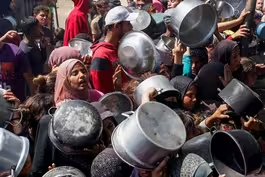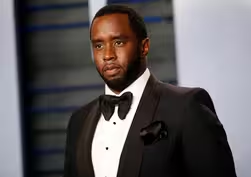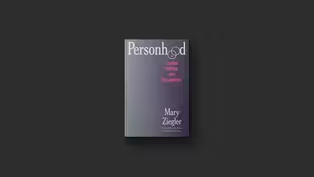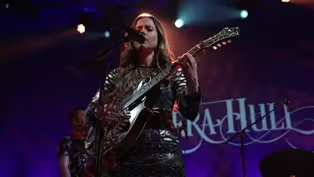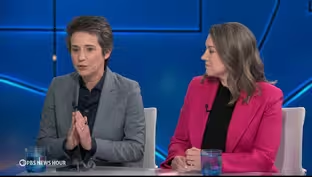
What the Constitution says about due process for noncitizens
Clip: 5/5/2025 | 9m 13sVideo has Closed Captions
What the Constitution says about noncitizens' rights as Trump doubts need for due process
Over the last few days, President Trump has repeatedly questioned the constitutional right to due process. His attacks come as the courts warn that the administration is exceeding the scope of his authority. White House correspondent Laura Barrón-López reports on the latest and Amna Nawaz discusses how the Trump administration is approaching due process with Georgetown law professor Steve Vladeck.
Problems playing video? | Closed Captioning Feedback
Problems playing video? | Closed Captioning Feedback
Major corporate funding for the PBS News Hour is provided by BDO, BNSF, Consumer Cellular, American Cruise Lines, and Raymond James. Funding for the PBS NewsHour Weekend is provided by...

What the Constitution says about due process for noncitizens
Clip: 5/5/2025 | 9m 13sVideo has Closed Captions
Over the last few days, President Trump has repeatedly questioned the constitutional right to due process. His attacks come as the courts warn that the administration is exceeding the scope of his authority. White House correspondent Laura Barrón-López reports on the latest and Amna Nawaz discusses how the Trump administration is approaching due process with Georgetown law professor Steve Vladeck.
Problems playing video? | Closed Captioning Feedback
How to Watch PBS News Hour
PBS News Hour is available to stream on pbs.org and the free PBS App, available on iPhone, Apple TV, Android TV, Android smartphones, Amazon Fire TV, Amazon Fire Tablet, Roku, Samsung Smart TV, and Vizio.
Providing Support for PBS.org
Learn Moreabout PBS online sponsorshipGEOFF BENNETT: Welcome to the "News Hour."
Over the last few days, President Trump has repeatedly questioned the right to due process, a fundamental right guaranteed by the Constitution that protects people against arbitrary government actions.
AMNA NAWAZ: The president's attacks come as the courts increasingly warn that the president is exceeding the scope of his authority.
Our White House correspondent, Laura Barron-Lopez, has this report.
LAURA BARRON-LOPEZ: At an event today announcing Washington, D.C., as the host city for the 2027 NFL draft, President Trump again doubted the need for due process under the Constitution.
DONALD TRUMP, President of the United States: It's a very difficult thing with the courts, because the courts have all of a sudden, out of nowhere, they said, maybe you have to have trials, trials.
We're going to have five million trials?
It doesn't work.
It doesn't work.
You wouldn't have a country left.
LAURA BARRON-LOPEZ: Ramping up its pressure campaign today to get undocumented immigrants to flee the U.S., the Homeland Security Department said they will pay people $1,000 if they self-deport to their home country voluntarily.
DONALD TRUMP: What we thought we'd do is a self-deport, where we're going to pay each one a certain amount of money.
And we're going to get them a beautiful flight back to where they came from.
And they have a period of time.
And if they make it, we're going to work with them so that maybe someday with a little work they can come back in, if they're good people.
LAURA BARRON-LOPEZ: The administration said it will also pay for travel assistance and de-prioritize removal by ICE for those who use the CBP Home app to say they are leaving.
On Sunday, in an interview on "Meet the Press" with Kristen Welker, the president questioned whether he had to uphold the Constitution.
KRISTEN WELKER, Moderator, "Meet the Press": Your secretary of state says everyone who's here, citizens and noncitizens, deserve due process.
Do you agree, Mr. President?
DONALD TRUMP: I don't know.
I'm not a lawyer.
I don't know.
KRISTEN WELKER: Well, the Fifth Amendment says as much.
DONALD TRUMP: I don't know.
It seems -- it seems -- it might say that, but if you're talking about that, then we'd have to have a million or two million or three million trials.
KRISTEN WELKER: But, even given those numbers that you're talking about, don't you need to uphold the Constitution of the United States as president?
DONALD TRUMP: I don't know.
I have to respond by saying again, I have brilliant lawyers that work for me, and they are going to obviously follow what the Supreme Court said.
LAURA BARRON-LOPEZ: Welker also asked the president if he was OK with a recession in the short term to reach his goals.
DONALD TRUMP: Look, yes, everything's OK. What we are -- I said, this is a transition period.
I think we're going to do fantastically.
LAURA BARRON-LOPEZ: Trump posted a slew of social media posts over the weekend, from an A.I.-generated image of himself as the pope to directing the Federal Bureau of Prisons to reopen and expand Alcatraz.
Another new idea, a 100 percent tariff on movies that aren't produced in the United States.
It's unclear which films this could apply to.
And, today, the White House said no final decisions have been made.
Meanwhile, Democrats are zeroing in on Trump's economic policy.
REP. HAKEEM JEFFRIES (D-NY): Donald Trump and House Republicans are crashing the economy in real time.
I think we were promised, what, a golden age in the United States of America, not a recession.
LAURA BARRON-LOPEZ: On the president's agenda tonight, a fund-raiser celebrating cryptocurrency as his family rakes in billions from crypto products.
The event costs $1.5 million per person and will benefit the MAGA Inc. pro-Trump super PAC.
For the "PBS News Hour," I'm Laura Barron-Lopez.
AMNA NAWAZ: For more on how the Trump administration is approaching due process and other rights granted under the Constitution, I'm joined now by Steve Vladeck, a constitutional law professor at Georgetown University.
Steve, great to see you.
Thanks for joining us.
Let me ask you about the part of the interview in which President Trump is asked if he should uphold the Constitution.
In the first part of his answer, he says, "I don't know."
What do you make of that response?
Is it the duty of the presidency to uphold the Constitution, or is that open to interpretation?
STEVE VLADECK, Georgetown University Law Center: It's not open to interpretation, Amna.
I mean, the president has taken the same oath twice, once in 2017 and once just 3.5 months ago.
It's only 35 words.
I suspect he probably knows some of it.
And it ends with him saying that he will affirm, protect, and defend the Constitution of the United States.
That's his job.
And maybe there are questions that can be debated in the courts, but whether the due process clause protects people is not a question.
It literally says that it does.
The Supreme Court has said it applies to anyone in the United States for more than 100 years now.
AMNA NAWAZ: Let me ask you about the argument being made by the White House, because, on this issue of due process, the White House deputy chief of staff, Stephen Miller, posted this online today.
He wrote: "The right of due process is to protect citizens from their government, not to protect foreign trespassers from removal.
Due process guarantees the rights of a criminal defendant facing prosecution, not an illegal alien facing deportation."
So, Steve, does the due process clause of the Fifth Amendment extend to citizens and noncitizens alike?
STEVE VLADECK: So it does.
I mean, again, the text says, no person, not no citizen.
The Supreme Court has been clear for decades that that includes individuals who are here out of status who are undocumented.
And, Amna, I mean, the other point is, even if you accept the premise of what Stephen Miller is saying, even if we accept, for the sake of argument, that undocumented immigrants are not protected by the due process clause, how do we know that individuals the federal government points the finger at and says, oh, they're an undocumented immigrant actually is?
The answer is due process.
Due process is what allows the government to take extreme actions against us, with the faith that we are who the government says we are, with the faith that we actually fall into the category of people who can be arrested, who can be deported, who can be imprisoned.
Without due process, then we're not living under the rule of law.
We're living under the arbitrary whims of one person.
AMNA NAWAZ: A lot of the due process questions center on the case of a man we have talked about a lot, Kilmar Abrego Garcia, who was wrongly deported to El Salvador.
The president was asked if he is defying Supreme Court orders to facilitate Garcia's return.
And the president said that his attorney general, his Department of Justice, they don't view it that way at all.
So, Steve, if his lawyers are telling him that what he's doing is fine and defensible and legal, why shouldn't the president listen to them?
STEVE VLADECK: Well, I think there are two different things going on here.
I mean, the first is, I'm not sure that his lawyers are actually telling him what the courts are telling them.
We're seeing both in the hearing in the Abrego Garcia case and in the case of the other individual who a different federal judge in Maryland has ordered to be returned, we're seeing the courts say, hey, we want you, government, to tell us what steps you have taken.
Meanwhile, we have President Trump in public interviews saying he hasn't even been asked by the lawyers to request from President Bukele that someone like Abrego Garcia be returned.
So, Amna, part of what's happening here is a shell game, where the president's saying one set of things publicly, where government lawyers are saying something else in court, and where there's some disconnect in between.
And what gets lost in the process is that there are not just these two folks who are still in detention and El Salvador, but upwards of 150 to 175 who were removed from the country back in March under the Alien Enemy act, which now we have multiple lower courts saying the government didn't have the power to do.
So we have this tension between a president saying, I have done everything I'm supposed to do, and federal court saying, no, you haven't.
And I think we're still in the middle of this story.
We're still going to have to see, when this goes back to the Supreme Court, which seems inevitable, are the justices going to require more than just these sort of ambiguous steps toward facilitating the release of these individuals from El Salvador?
AMNA NAWAZ: So, Steve, the president mentioned deferring to his lawyers.
He mentioned not being a lawyer himself five separate times in this latest interview on NBC.
What does all of this tell you, in the minute or so we have left, about the role of the White House counsel, the attorney general, the Department of Justice in this administration?
STEVE VLADECK: I think part of what we're seeing now is something that looks like this, where the president's saying, I'm not a lawyer, and where the lawyers are saying, we just work for the president.
It's an effort, I think, on the part of both of these sets of individuals to deflect accountability.
And, at the end of the day, Amna, if the government's going to rely upon this idea that the president is the unitary head of the executive branch, that everyone and everything is supposed to be working for him, that the Justice Department is not our lawyers, they're the president's lawyers, it seems like he can't, in the same breath, deny responsibility, defer accountability, when a government in his name, when lawyers representing him are breaking the law.
And I think that's what we're going to see develop in the federal courts in the days and weeks to come.
At some point, the rubber's going to hit the road.
And I think the president's not going to be able to play so fast and loose with his responsibilities going forward.
AMNA NAWAZ: Steve Vladeck of Georgetown University, thank you so much for your time.
Always good to speak with you.
STEVE VLADECK: You too.
Thank you.
The implications of Israel's plan to expand Gaza operations
Video has Closed Captions
Clip: 5/5/2025 | 9m 52s | The implications of Israel's plan to expand military operations in Gaza (9m 52s)
Jury selection begins for Diddy’s sex trafficking trial
Video has Closed Captions
Clip: 5/5/2025 | 4m 45s | What happened in the courtroom as jury selection begins for Diddy’s sex trafficking trial (4m 45s)
New book 'Personhood' examines reproductive rights battle
Video has Closed Captions
Clip: 5/5/2025 | 8m 28s | New book 'Personhood' examines escalating battle over reproductive rights (8m 28s)
Sierra Hull on her journey to becoming a mandolin virtuoso
Video has Closed Captions
Clip: 5/5/2025 | 6m 35s | Sierra Hull reflects on her journey to becoming a mandolin virtuoso (6m 35s)
Tamara Keith and Amy Walter on voters and the economy
Video has Closed Captions
Clip: 5/5/2025 | 7m 26s | Tamara Keith and Amy Walter on who voters believe is responsible for the current economy (7m 26s)
Providing Support for PBS.org
Learn Moreabout PBS online sponsorship
- News and Public Affairs

FRONTLINE is investigative journalism that questions, explains and changes our world.

- News and Public Affairs

Amanpour and Company features conversations with leaders and decision makers.












Support for PBS provided by:
Major corporate funding for the PBS News Hour is provided by BDO, BNSF, Consumer Cellular, American Cruise Lines, and Raymond James. Funding for the PBS NewsHour Weekend is provided by...
